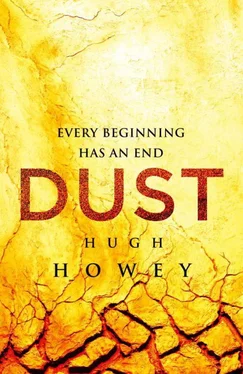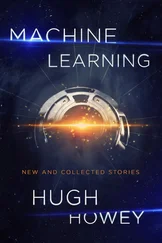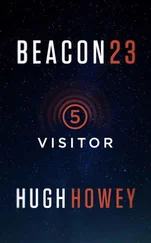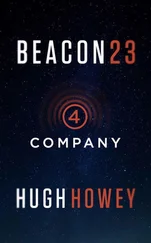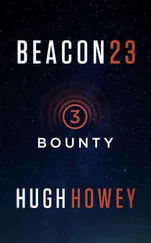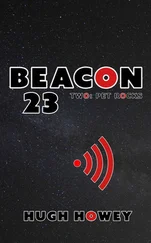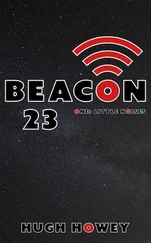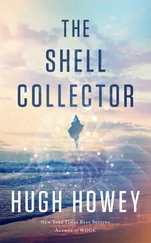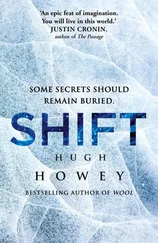“And you think we should be digging toward them?”
Juliette hadn’t considered that. “Maybe,” she said. “That might be our only way out of this, if we can reach them. But first we need to know who is over there and if it’s safe. It might be as ruined as our silo. Or as empty as this one. Or full of people not at all happy to see us. The air could be toxic when we push through. But I can tell you that there are others.”
One of those digging slid down the rubble to join the conversation. “And what if everything is fine on the other side of this pile? Aren’t you the one who always has to go look and see?”
Juliette absorbed the blow. “If everything is fine over there, then they will come for us. We will hear from them. I would love for that to be true, for this to happen. I would love to be wrong. But I’m not.” She studied their dark faces. “I’m telling you that there’s nothing over there but death. You think I don’t want to hope? I’ve lost… we’ve all lost people we love. I listened as men I loved and cared about breathed their last, and you don’t think I want to get over there and see for myself? To bury them proper?” She wiped her eyes. “Don’t you think for a moment that I don’t want to grab a shovel and work three shifts until we’re through to them. But I know that I would be burying those of us who are left. We would be tossing this dirt and these rocks right into our own graves.”
No one spoke. Somewhere, gravity won a delicate struggle against a rock, and the loose stone tumbled with clacks and clatters toward their feet.
“What would you have us do?” Fitz asked, and Juliette heard an intake of air from Courtnee, who seemed to bristle at the thought of anyone taking advice from her ever again.
“We need a day or two to determine what happened. Like I said, there are a lot of worlds like our own out there. I don’t know what they hold, but I know one of them seems to think it’s in charge. They have threatened us before, saying they can push a button and end us, and I believe that’s what they’ve done. I believe it’s what they did to this other world as well.” She pointed down the tunnel to Silo 17. “And yes, it may have been because we dared to dig or because I went outside looking for answers, and you can send me to clean for those sins. I will gladly go. I will clean and die in sight of you. But first, let me tell you what little I know. This silo we’re in, it will flood. It is slowly filling even now. We need to power the pumps that keep it dry, and we need to make sure that the farms stay wet, the lights stay on, that we have enough air to breathe.” She gestured to one of the torches set into the wall. “We’re going through an awful lot of air.”
“And where are we supposed to get this power? I was one of the first through to the other side. It’s a heap of rust over there!”
“There’s power up in the thirties,” Juliette said. “Clean power. It runs the pumps and lights in the farms. But we shouldn’t rely on that. We brought our own power with us—”
“The backup generator,” someone said.
Juliette nodded, thankful to have them listening. For now, at least, they’d stopped digging.
“I’ll shoulder the burden for what I’ve done,” Juliette said, and the flames blurred behind a film of tears. “But someone else brought this hell on us. I know who it was. I’ve spoken with him. We need to survive long enough to make him and his people pay—”
“Revenge,” Courtnee said, her voice a harsh whisper. “After all the people who died trying to get some measure of that when you left to clean—”
“Not revenge, no. Prevention.” Juliette peered down the dark tunnel and into the gloom. “My friend Solo remembers when this world — his world — was destroyed. It wasn’t gods that brought this upon us, but men. Men close enough to talk to by radio. And there are other worlds standing out there beneath their thumbs. Imagine if someone else had acted before now. We would have gone about our lives, never knowing the threat that existed. Our loved ones would be alive right now.” She turned back to Courtnee and the others. “We shouldn’t go after these people for what they did. No. We should go after them for what they’re capable of doing. Before they do it again.”
She searched her old friend’s eyes for understanding, for acceptance. Instead, Courtnee turned her back on her. She turned away from Juliette and studied the pile of rubble they’d been clearing. A long moment passed, smoke filling the air, orange flames whispering.
“Fitz, grab that torch,” Courtnee ordered. There was a moment’s hesitation, but the old oilman complied. “Douse that thing,” she told him, sounding disgusted with herself. “We’re wasting air.”
Elise heard voices down the stairwell. There were strangers in her home. Strangers. Rickson used to frighten her and the twins into behaving by telling them stories of strangers, stories that made them never want to leave their home behind the farms. In a long time ago, Rickson used to say, anyone you didn’t know was out to kill you and take your things. Even some of those who did know you couldn’t be trusted. That’s what Rickson used to say late at night when the clicking timers made the grow lights go suddenly out.
Rickson told them the story over and over of how he was born because of two people in love — whatever that meant — and that his father had cut a poisoned pill out of his mother’s hip, and that’s how people had babies. But not all people had babies out of two people in love. Sometimes it was strangers, he said, who came and took whatever they wanted. It was men in those old days, and often what they wanted was for women to make babies, and so they cut poisoned pills right out of their flesh and the women had babies.
Elise didn’t have a poisoned pill in her flesh. Not yet. Hannah said they grew in there late like grown-up teeth, which was why it was important to have babies as early as you could. Rickson said this weren’t true at all, and that if you were born without a pill in your hip you’d never have one, but Elise didn’t know what to believe. She paused on the stairs and rubbed her side, feeling for any bumps there. Tonguing the gap between her teeth in concentration, she felt something hard beneath her gums and growing. It made her want to cry, knowing her body could do foolish things like growing teeth and pills beneath her flesh without her asking. She called up the stairs for Puppy, who had squirmed loose again and had bounded out of sight. Puppy was bad like this. Elise was starting to wonder if puppies were a thing you could own or if they were always running away. But she didn’t cry. She clutched the rail and took another step and another. She didn’t want babies. She just wanted Puppy to stay with her, and then her body could do whatever it wanted.
A man overtook her on the stairs — it wasn’t Solo. Solo had told her to stick close. “Tell Puppy to stick close,” she would say when Solo caught up to her. It paid to have excuses ready like this. Like pumpkin seeds in pockets. This man overtaking her looked back at her over his shoulder. He was a stranger, but he didn’t seem to want her things. He already had things, had a coil of the black and yellow wire that dipped from the ceiling in the farms that Rickson said never to touch. Maybe this man didn’t know the rules. It was peculiar to see people she didn’t know in her home, but Rickson lied sometimes and was wrong some other times and maybe he lied or was wrong with his scary stories and Solo had been right. Maybe it was a good thing, these strangers. More people to help out and make repairs and dig water trenches in the soil so all the plants got a good drink. More people like Juliette, who had come and made their home better, took them up to where the light was steady and you could heat water for a bath. Good strangers.
Читать дальше
